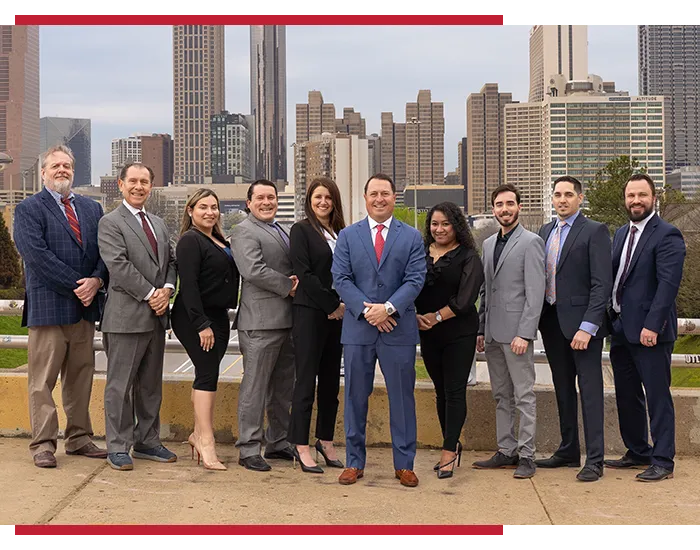Comprehensive Guide to Georgia Workers’ Compensation Benefits in Hapeville, GA
Understanding Workers’ Comp Benefits in Georgia
If you’ve been injured at work in Hapeville, East Point, College Park, or other nearby areas, securing workers’ compensation benefits can seem overwhelming. We understand the physical, emotional, and financial challenges that come with a workplace injury. At The Law Offices of Humberto Izquierdo, Jr., PC, we’re here to guide you through the workers’ comp process with confidence and help you recover the benefits you deserve.
Whether you’re a long-time employee in a Hapeville manufacturing facility, a construction worker near Cofield Park, or an office worker on Main Street, our team is dedicated to assisting you in recovering the benefits you’re entitled to. We proudly serve workers throughout Hapeville, East Point, College Park, and surrounding neighborhoods.
Get the Legal Help You Need Today
If you’ve been injured on the job in Hapeville, East Point, College Park, or the nearby areas, don’t hesitate to contact Humberto Izquierdo, Jr. and his team. We offer free consultations to discuss your case and determine how we can help you recover the workers’ compensation benefits you deserve.
Call us at (770) 888-8901 to schedule your free consultation.
Meet Humberto Izquierdo, Jr. – Your Trusted Workers’ Compensation Lawyer in Hapeville, GA
At The Law Offices of Humberto Izquierdo, Jr., PC, we take pride in providing compassionate and skilled legal representation to injured workers in Hapeville, East Point, and surrounding areas. At the core of our firm is Humberto Izquierdo, Jr., a highly experienced and trusted attorney who has spent over 15 years helping injured workers navigate Georgia’s workers’ compensation system.
A Unique Legal Perspective
Humberto’s background as an insurance defense attorney gives him a unique advantage when advocating for workers’ compensation clients in Hapeville. Before founding his firm, Humberto worked for insurance companies, defending employers and insurance carriers against claims. This experience gives him unparalleled insight into the tactics used by insurers to deny or reduce claims. Now, Humberto uses that knowledge to protect injured workers from insurance companies that attempt to undercut or delay claims.
Expertise and Commitment to Workers’ Rights
Throughout his career, Humberto Izquierdo, Jr. has built a solid reputation for standing up for workers’ rights. His firm is committed to ensuring that every client in Hapeville, East Point, and surrounding areas receives the compensation and care they deserve after suffering a work-related injury. Humberto’s legal practice is focused on helping injured workers recover benefits for medical expenses, lost wages, and permanent disabilities.
As a bilingual attorney, Humberto serves Spanish-speaking clients in Hapeville and throughout Georgia, ensuring that language is never a barrier for those seeking justice and fair compensation. His client-centered approach and ability to communicate in both English and Spanish have made him a trusted advocate for the local community.
Proven Success in Workers’ Compensation Cases
Humberto Izquierdo, Jr. has a track record of success in handling complex workers’ compensation claims. His firm has secured significant settlements and favorable rulings for clients throughout Georgia, including in Hapeville. His hands-on approach ensures that each case is treated with the utmost care and attention to detail.
Whether you’re facing a denied claim, dealing with complex medical issues, or disputing your employer’s insurance company, Humberto is ready to take action on your behalf. His goal is simple: to provide injured workers in Hapeville with the support they need to regain their health and secure their future.
Education and Legal Background
Humberto Izquierdo, Jr. is a graduate of Georgia State University College of Law, where he earned his law degree and honed his skills in personal injury and workers’ compensation law. His deep understanding of both Georgia’s legal landscape and the workers’ compensation system allows him to craft effective legal strategies that get results for his clients in Hapeville and across Georgia.
In addition to his legal expertise, Humberto is a member of several professional organizations, including the State Bar of Georgia, where he continually updates his legal knowledge and skills to stay ahead of changes in workers’ compensation laws.
A Personal Commitment to Justice and Client Care
What sets Humberto Izquierdo, Jr. apart is his personal commitment to each case he handles. He understands that dealing with an injury is not only physically painful but can also be emotionally and financially taxing. Whether you’re dealing with a temporary injury or a permanent disability, Humberto and his team are here to ensure your case is handled with the care and urgency it deserves. His team is always available to answer questions and guide you through every stage of the workers’ compensation process.
Why You Can Trust Humberto Izquierdo, Jr. with Your Workers’ Comp Case
-
Experience: Over 15 years of experience specializing in workers’ compensation law and personal injury.
-
Proven Track Record: Successful settlements and verdicts in workers’ compensation cases across Georgia, including in Hapeville.
-
Client-Centered Approach: Empathetic, professional, and dedicated to your recovery.
-
Bilingual Services: Helping both English and Spanish-speaking clients navigate the legal process.
-
Comprehensive Legal Support: From filing your claim to appealing denied benefits, Humberto and his team are by your side every step of the way.
What Are Workers’ Compensation Benefits?
Workers’ compensation is a state-mandated insurance program that provides financial and medical benefits to employees injured on the job. In Hapeville, East Point, College Park, and surrounding areas, workers who are hurt on the job can rely on these benefits to cover medical expenses, lost wages, and rehabilitation costs. Whether you work in construction, manufacturing, or any other industry in Hapeville, you are entitled to compensation if you’ve been injured during your employment.
Why Workers’ Compensation Benefits Are Essential for Employees in Hapeville
When you suffer an injury at work in Hapeville, East Point, or anywhere else in Fulton County, workers’ compensation benefits ensure that you don’t face financial hardship while you recover. These benefits cover medical treatment, wage replacement, and other essential services that allow you to focus on healing without the added burden of financial strain.
In Hapeville, where many employees are working in physically demanding jobs, such as construction or manufacturing, workers’ compensation provides an essential safety net.
Eligibility for Workers’ Comp Benefits in Hapeville
To qualify for workers’ compensation benefits in Hapeville, you must meet several key requirements outlined in the Georgia Workers’ Compensation Act:
-
Employee Status: Only employees, not independent contractors, are covered under workers’ compensation.
-
Injury or Illness: Your injury must be directly related to your job duties.
-
Timely Reporting: Report your injury within 30 days to maintain eligibility.
Types of Workers’ Compensation Benefits Available in Hapeville, GA
Georgia workers’ compensation provides a range of benefits to workers who suffer job-related injuries or illnesses. The type of benefits you’re eligible for depends on the severity of your injury and your ability to return to work. Below are the key benefits available to workers in Hapeville, East Point, College Park, and surrounding neighborhoods.
Medical Benefits
Workers’ compensation covers all reasonable and necessary medical treatments related to your work injury in Hapeville. These treatments may include:
-
Emergency medical care
-
Doctor visits
-
Surgeries
-
Physical therapy
-
Prescriptions and rehabilitation
If you’re injured at work in Hapeville, East Point, or College Park, our firm will connect you with local healthcare providers like Piedmont Hapeville Medical Center, Emory Healthcare, and specialized medical centers that treat work-related injuries. These benefits ensure that you receive the medical care you need to recover from your injury without worrying about paying out-of-pocket.
Maximum Medical Improvement (MMI) in Hapeville, GA
Maximum Medical Improvement (MMI) is a key milestone in a workers’ compensation case. It refers to the point at which your work-related injury or illness has healed as much as it can be expected to, and no further significant medical improvement is anticipated, even with ongoing treatment.
Reaching MMI is important because it often marks the end of Temporary Total Disability (TTD) benefits and the beginning of potential Permanent Partial Disability (PPD) or Permanent Total Disability (PTD) benefits. At MMI, your doctor will usually assign a disability rating to reflect how your injury affects your ability to work.
For workers in Hapeville, particularly those in physically demanding roles such as construction, warehouse, or manufacturing, knowing when you’ve reached MMI helps determine your next steps in returning to work or transitioning to permanent disability benefits. After MMI, you may also be eligible for vocational rehabilitation if your injury prevents you from returning to your previous job.
Working with an experienced Hapeville workers’ compensation attorney ensures that your MMI evaluation and subsequent disability benefits are handled correctly, maximizing your claim and protecting your rights.
What does Maximum Medical Improvement (MMI) mean?
MMI is the point at which your work-related injury has stabilized, and no further significant medical improvement is expected, even with ongoing treatment.
How does MMI affect my benefits?
Once you reach MMI, Temporary Total Disability (TTD) benefits typically end. You may then qualify for Permanent Partial Disability (PPD) or Permanent Total Disability (PTD) benefits, depending on your injury and disability rating.
Who determines if I’ve reached MMI?
Your treating physician evaluates your condition and determines if you’ve reached MMI, taking into account your injury type, treatments received, and your ability to work.
Can I still receive medical care after reaching MMI?
Yes, you may continue to receive medical care for ongoing issues related to your work injury, but it usually focuses on managing symptoms rather than expecting further improvement.
What are my next steps after reaching MMI?
After MMI, you may be entitled to PPD or PTD benefits, vocational rehabilitation if you cannot return to your previous job, or return to light-duty work if possible. An attorney can help ensure your benefits are calculated fairly and that your claim transitions smoothly.
Temporary Total Disability (TTD) Benefits
If your injury prevents you from working at all, you may be entitled to Temporary Total Disability (TTD) benefits. TTD benefits are generally two-thirds of your average weekly wage (AWW), subject to Georgia’s maximum wage limits. These benefits are crucial for workers who are temporarily unable to perform their job duties due to injury.
How TTD Benefits Help Workers in Hapeville
In Hapeville, where many workers are employed in physical jobs like construction or transportation, injuries that cause total disability are relatively common. For example, workers in the construction industry near Dorsey Road or at Hartsfield-Jackson Atlanta International Airport are often exposed to serious accidents. TTD benefits help ensure that these workers don’t face financial hardship while recovering from their injuries.
Temporary Partial Disability (TPD) Benefits
If you’re able to return to work but only at reduced hours or in a lighter role, you may be eligible for Temporary Partial Disability (TPD) benefits. These benefits help replace the lost wages from reduced hours or lighter duties.
How TPD Benefits Work in Hapeville
For instance, if you return to work in a light-duty role but your earnings are less than they were prior to your injury, TPD benefits will make up the difference. This ensures you aren’t financially disadvantaged while your body heals. In Hapeville, where many workers in construction, manufacturing, and transportation industries experience partial disabilities, TPD benefits provide critical support during recovery.
Permanent Partial Disability (PPD) Benefits
If you sustain a permanent injury, such as the loss of a limb or permanent impairments that affect your ability to perform certain job tasks, you may be entitled to Permanent Partial Disability (PPD) benefits. These benefits are designed to compensate workers for the long-term impact of permanent disabilities.
Understanding Permanent Partial Disability in Hapeville
In Hapeville and surrounding areas like East Point and College Park, workers in physically demanding industries—such as construction, manufacturing, or warehouse work—are more likely to sustain permanent injuries. PPD benefits help compensate for the reduced earning capacity caused by permanent impairments, ensuring that workers can still support themselves and their families.
Vocational Rehabilitation Benefits
If you’re unable to return to your previous job because of your injury, Georgia offers vocational rehabilitation benefits. These benefits help pay for job retraining, education, and job placement services, helping you transition to a new career if necessary.
Vocational Rehab in Hapeville
In Hapeville, workers in physically demanding roles such as construction or transportation often face challenges returning to their previous job after an injury. If your injury prevents you from resuming your previous work in these fields, vocational rehabilitation can provide the skills and training needed for a career change. Our team helps connect injured workers to vocational rehab services in Hapeville, East Point, and nearby areas, so they can get back to work in a new role.
Death Benefits
In the tragic event that a worker dies as a result of a work-related injury, their dependents may be eligible for death benefits. These benefits typically include:
-
Funeral costs
-
Weekly payments to surviving family members
If a worker dies from a work-related injury in Hapeville, their surviving family members can seek death benefits to help cover funeral expenses and replace lost income. Our firm can help you navigate the process of claiming these benefits for your loved ones in Hapeville, East Point, and College Park.
Common Challenges in Workers’ Compensation Claims in Hapeville, GA
Although workers’ compensation is designed to provide support for injured workers, the process can often be challenging. If you’ve been hurt at work in Hapeville, East Point, or College Park, there are several common hurdles you may face when filing your workers’ compensation claim. Below are some of the issues many workers encounter, and how our experienced workers’ compensation attorneys can help you overcome them.
Claim Denials
One of the most frustrating challenges workers face in Hapeville is when their workers’ compensation claims are denied. Insurance companies often deny claims for various reasons, such as a lack of medical evidence or failing to report the injury promptly. In Hapeville, where many workers are employed in construction, transportation, and warehouse industries, claim denials can add unnecessary stress to already difficult situations.
If your claim has been denied, it’s important not to give up. Our skilled attorneys are here to help you challenge the denial, gather the necessary evidence, and ensure that you receive the benefits you deserve. We will fight to make sure you don’t face financial hardship due to an unjust denial.
Delays in Benefits
Another common issue workers in Hapeville face is delays in receiving benefits. Sometimes administrative errors or disputes between the employer and the insurance company lead to delayed payments. For example, workers in physically demanding jobs like construction or manufacturing on Main Street or Dorsey Road may find that their medical bills are piling up while they wait for workers’ compensation benefits to come through.
Our firm can help resolve these delays by directly addressing the issue with the insurance company or your employer. We’ll advocate on your behalf and ensure that your claim gets processed efficiently, so you can receive the benefits you’re entitled to without unnecessary delay.
Disputes Over Disability Ratings
Disagreements over disability ratings are another challenge injured workers often face. Disability ratings determine the amount of compensation you’re entitled to, and if there’s a dispute about the extent of your injury or how it affects your ability to work, you may not receive the full benefits you’re owed.
In Hapeville, where many workers experience spinal injuries, repetitive stress injuries, or fractures from accidents in high-risk industries like construction or warehousing, it’s essential that your injury is properly rated. Our Hapeville workers’ compensation lawyers work closely with medical experts to ensure that your injury is accurately assessed. We’ll help you understand the ratings process and ensure that you receive compensation that reflects the true impact of your injury.
Contact Our Experienced Workers’ Compensation Lawyers Today
If you’ve been injured at work in Hapeville, East Point, College Park, or surrounding areas, don’t wait to get the help you need. The Law Offices of Humberto Izquierdo, Jr., PC offers free consultations to discuss your case. Let us help you navigate the workers’ compensation process, resolve any disputes, and secure the compensation you deserve.
Call us at (770) 888-8901 or fill out our online form to schedule your free consultation.
Our team is ready to fight for your rights and ensure you get the benefits you need to recover and get back on your feet.
Frequently Asked Questions About Workers’ Compensation Benefits in Hapeville, GA
What types of workers’ compensation benefits are available in Georgia?
Georgia offers several types of workers’ compensation benefits depending on the severity of your injury. These include:
-
Medical benefits: Covering necessary medical treatments, including doctor visits, surgeries, physical therapy, and medications related to the injury.
-
Temporary Total Disability (TTD) benefits: Wage replacement benefits for workers unable to work due to an injury.
-
Temporary Partial Disability (TPD) benefits: Benefits for workers who can return to work in a limited capacity but earn less than their regular wages.
-
Permanent Partial Disability (PPD) benefits: Compensation for permanent impairments that reduce your ability to work.
-
Vocational Rehabilitation benefits: Assistance with retraining for a new job if you are unable to return to your previous position.
-
Death benefits: Provided for the dependents of a worker who dies due to a work-related injury, including funeral costs and income replacement.
How do Temporary Total Disability (TTD) benefits work in Georgia?
In Georgia, Temporary Total Disability (TTD) benefits provide wage replacement for workers who are temporarily unable to work due to a work-related injury. These benefits typically pay two-thirds of your average weekly wage (AWW), subject to a maximum limit set by the state. TTD benefits are provided until you can return to work or your treating physician determines that you have reached Maximum Medical Improvement (MMI).
In areas like Hapeville, where many workers are employed in physically demanding jobs such as construction or warehouse work, TTD benefits are crucial. Workers in these fields are often prone to serious injuries, and TTD benefits help replace lost wages during recovery.
How are Temporary Partial Disability (TPD) benefits calculated in Georgia?
Temporary Partial Disability (TPD) benefits are for workers who return to work in a limited capacity but earn less than they did before their injury. In Georgia, the amount of TPD benefits is based on the difference between your pre-injury earnings and your post-injury earnings. These benefits help bridge the wage gap until you can return to full capacity at your job.
For example, if you return to work at a light-duty role in a Hapeville warehouse but earn less than your previous position, TPD benefits will help replace the difference in wages. These benefits ensure you aren’t financially penalized for taking on reduced duties.
How are Permanent Partial Disability (PPD) benefits determined in Georgia?
Permanent Partial Disability (PPD) benefits are awarded when an injury results in permanent impairment, affecting your ability to perform your usual work duties. In Georgia, the disability rating assigned to your injury will determine the amount of compensation you are entitled to. The rating reflects the extent of your impairment and how it affects your earning capacity. PPD benefits are typically paid weekly for a set period, based on the nature of the disability.
In Hapeville, where many workers are in construction or manufacturing roles, permanent injuries like spinal cord damage or the loss of a limb can significantly impact your ability to return to work. Our team helps ensure you receive the proper rating and compensation for your permanent impairments.
How long can I receive workers’ compensation benefits in Georgia?
The duration of your workers’ compensation benefits in Georgia depends on the type of benefits you are receiving:
-
TTD benefits continue until you can return to work or your doctor determines you have reached MMI.
-
TPD benefits are available while you work in a limited capacity, earning less than your pre-injury wage.
-
PPD benefits are paid for a set period, depending on your disability rating.
-
Vocational Rehabilitation benefits are available for as long as necessary to help you transition into a new job or career.
What medical expenses are covered by workers’ compensation in Georgia?
Workers’ compensation benefits in Georgia cover all reasonable and necessary medical treatments related to your injury. This includes:
-
Hospital visits
-
Surgeries
-
Doctor consultations
-
Medications
-
Physical therapy
-
Rehabilitation services
You must see an approved physician within the workers’ compensation network unless your employer allows you to seek treatment outside of the network. These expenses will be covered by your workers’ compensation insurance, easing your financial burden during recovery.
How are workers’ compensation benefits affected by the type of injury in Georgia?
The type of injury you sustain plays a critical role in determining the benefits you receive. For example, if you suffer a temporary injury, you may qualify for TTD or TPD benefits. If the injury results in permanent impairment, you may be eligible for PPD benefits. Workers who are unable to return to their prior role may also qualify for vocational rehabilitation to retrain for a new career.
What should I do if my workers’ compensation claim is denied in Georgia?
If your workers’ compensation claim is denied, you have the right to appeal the decision. The first step is to request a hearing with the Georgia State Board of Workers’ Compensation. During the hearing, you and the insurance company will present evidence to support your case. If the hearing does not resolve the issue, further appeals can be made.
It is highly beneficial to work with an experienced workers’ compensation attorney to improve your chances of a successful appeal and ensure you get the benefits you are entitled to.
Can I choose my own doctor for workers’ compensation treatment in Georgia?
In Georgia, you must initially see a doctor within the workers’ compensation network approved by your employer’s insurance company. If you’re not satisfied with your treatment, you can request a change of physician within the network. In some cases, you may seek approval from the Georgia State Board of Workers’ Compensation to switch to a different doctor outside of the network if necessary.
How do workers’ compensation benefits affect my job in Georgia?
In Georgia, workers cannot be fired or retaliated against for filing a workers’ compensation claim. Georgia law provides protections for employees who seek benefits after a work-related injury. If you feel your employer has retaliated against you for filing a claim, it is important to contact a workers’ compensation attorney to discuss your rights and take legal action if necessary. Retaliation for filing a claim is prohibited and can result in penalties for the employer.
Can I receive workers’ compensation benefits for a repetitive stress injury in Georgia?
Yes, repetitive stress injuries, also known as occupational diseases, are covered by workers’ compensation benefits in Georgia. These injuries develop over time due to repetitive tasks or prolonged exposure to certain working conditions. Common examples include:
-
Carpal Tunnel Syndrome
-
Tendinitis
-
Back pain from repetitive motions
Workers must provide medical evidence showing that the condition is job-related to qualify for workers’ compensation benefits.
What happens if I can’t return to my previous job due to a work injury in Georgia?
If you’re unable to return to your previous job due to your injury, you may qualify for vocational rehabilitation benefits. These benefits help provide job retraining, education programs, and job placement services to help you transition into a new career. Vocational rehabilitation is available for as long as necessary to help you re-enter the workforce if your injury prevents you from returning to your previous role.
Resources on Workers’ Compensation Benefits in Hapeville, GA
Explore our comprehensive guides to understand the various aspects of workers’ compensation benefits in Hapeville, East Point, College Park, and surrounding areas:
-
TTD, TPD, PPD, PTD & MMI: Understanding Workers’ Comp Disability Benefits in Georgia
Delve into the distinctions between Temporary Total Disability (TTD), Temporary Partial Disability (TPD), Permanent Partial Disability (PPD), Permanent Total Disability (PTD), and Maximum Medical Improvement (MMI), and how each classification impacts your benefits in Hapeville. -
What Benefits Can You Get from a Workers’ Comp Claim in Georgia?
Gain insights into the range of benefits available under Georgia’s workers’ compensation system, including medical treatment, wage replacement, and vocational rehabilitation. These benefits can significantly help workers in Hapeville and nearby areas.
These resources are designed to provide clarity and assist you in navigating the complexities of workers’ compensation claims in Hapeville and the surrounding communities.
Get the Workers’ Comp Benefits You Deserve Today in Hapeville, GA
If you’ve been injured on the job in Hapeville, East Point, College Park, or anywhere in Fulton County, don’t wait to take action. Humberto Izquierdo, Jr. and his experienced team are here to fight for the compensation and support you need to recover and move forward. With over 15 years of experience in workers’ compensation law, we have the knowledge and dedication to ensure you receive the benefits you deserve.
Contact Us Now for a Free Consultation
Call us at (770) 888-8901 or fill out our online form to schedule your free consultation.
Let us guide you through the workers’ compensation process and help you get the justice you deserve.
Don’t face this challenging time alone—we’re here to help.







